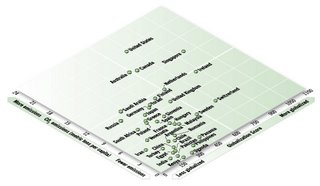The enquete 21 minutes is out. Does it matter for Groenlinks? Well, let's answer this question in positive. It does matter. Three reasons, among many:
1) From the undecided voter, groenlinks is the party with more chances.
2) The acherban from Groenlinks is the more restricted.
3) Groenlinks is the party that has lost more votes from the allochtoon population.
Lets go in these points:
The undecided, and our restricted interests
The perspective that 21minutes gives will certainly make the strategic council of groenlinks happy. Indeed Groenlinks is the party that retains most former voters. Only the CDA enjoys our 52% of re-incident voters, meaning that 52% of the people that vote groenlinks in the previous elections, will vote groenlinks again. The estrategic inset of groenlinks campaign was to preserve our voters as a first priority, and in the view of 21minutes, the strategy works out. Now, consider the challengers that such strategy produce. From the people that does not know yet what to vote, a huge majority considers GL as their likely choice (41%, followed by 37% of the SP). The question remains: If we have such a big potential in the undecided voter, does it make sense to campaign for the people that votes GL always? My answer would be no, not really. It seems that GL has still to want to get all those votes waiting for us to be obtained. It seems to me that groenlinksers are just too confortable in our position as small party, with a restricted set of interesting issues. Consider the conceptual spread of the groenlinks acterban. There is no other party with an achterban that cares for less issues than us. My thinking here is that we have to dare to be more ambitious, both conceptually and strategically. Reading what dutch people care for, groenlinks certainly cares for much of the same: more solidarity, better social care, better environment. But we should want to become a real alternative to the PvdA.

The bleeding allochtoon voter, and the Kleurrijk Platform
The bleeding, and not the bloody. Once upon a time, or say, in the last national elections, Groenlinks enjoyed a luxurious position with the allochtoon voter. We were indeed the party which allochtonen wanted to vote for. No longer. We are the party that most votes preserve, as I said above... but we are also the party that has lost most votes from the allochtoon population. The allochtoon blood from our party is bleeding away. And that is a serious problem. It seems to me unneeded to argue that a by-product of the fortuin revolution is the hardening of our society in regards of the allochtoon. So I would expect that allochtonen would, if anything, fly over to the ranks of groenlinks. That has not happened. Instead, we have loose them. Why?
Well, several answers are possible. As vz of the Kleurrijk Platform, I recognize that our werkgroep, if anything at all, has diminished its importance inside Groenlinks. In the last four years we have disagreed with the crucial decisions of our party regarding concepts and strategies towards the allochtoon question. We did not, and do not believe that integration can happen through emancipation. We though then that this was an unfortunate political choice. And we disagreed with the choices that this campaign has made. The multicultural issue should not be framed as a tolerance issue. Migrants in this country do not wish to be tolerated, nobody does. The migrants, as the 21minutes enquete shows, strongly care for the core issues of left wing parties: social security and economical inequality. Groenlinks does not need to become a allochtoon populist party to regain her votes, groenlinks needs only to work her own, left wing agenda better.
But of course, it is just too easy to claim that because groenlinks do not agree with the Kleurrijk Platform, groenlinks has lost the allochtoon vote. From my viewpoint, the Kleurrijk Platform in the particular, and the active migrant groenlinkser in the general must be much more assertive inside the party life. Inside groenlinks we are bad politicians. We have allowed our kader to bleed away, and we have failed to convince our partijgenoten of our views. From the viewpoint of the Kleurrijk Platform, improvement in groenlinks starts by improvement of the migrant politician inside Groenlinks.



